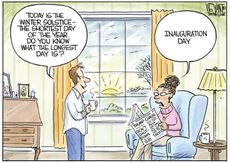Did Bill Clinton's welfare reforms make the Great Recession worse?
The '90s welfare overhaul is hailed by many in both parties as a historic success. But it's coming under new scrutiny as the economy struggles

Pledging to "end welfare as we know it," President Bill Clinton in 1996 put his signature to landmark legislation that fundamentally reformed the American welfare system. The law has long been praised for ending excessive dependency on government largesse, and Republicans in particular have pointed to the law as a model for reforming other ballooning entitlement programs, such as Medicare and Social Security. But in truth, argues Jason DeParle at The New York Times, it was only in the light of the 1990s' booming economy that welfare reform appeared successful. Once the the Great Recession hit in the late 2000s, single mothers — welfare's main recipients — were left without a helping hand, largely because Clinton's reforms made it easier for states to deny handouts and instead use federal welfare grants to plug their own budget holes. Did Clinton's welfare overhaul actually make things worse?
No. Welfare only encourages poverty and single motherhood: Before Clinton's reforms, welfare "was responsible for accelerating the breakup of the black family and creating the mindless cycle of government dependency," says Donald Douglas at American Power. Single-parent families received a "smorgasbord of public services in addition to cash payments," which gave them "literally no incentive to find a job." Don't let liberals use the economic slowdown to resurrect a "left-wing dependency-style welfare state."
"The New York Times wants to bring back welfare dependency"
Subscribe to The Week
Escape your echo chamber. Get the facts behind the news, plus analysis from multiple perspectives.

Sign up for The Week's Free Newsletters
From our morning news briefing to a weekly Good News Newsletter, get the best of The Week delivered directly to your inbox.
From our morning news briefing to a weekly Good News Newsletter, get the best of The Week delivered directly to your inbox.
But welfare reform stranded the poor: Clinton's welfare law was "a meat-axe for people to swing at what already was a shredded safety net," says Charles P. Pierce at Esquire. The law was premised on "fairy tales about young bucks buying steaks and welfare queens with their Cadillacs," when it actually "gave everybody permission not to care about poverty anymore." States now use federal welfare money "for all kinds of other parochial purposes," effectively abandoning "the people at the very bottom of society." Clinton's law continues to be praised as an "unalloyed triumph," but the truth is far grimmer.
"The legacy of 'welfare reform' and a poverty of ideas"
And it also hurt the broader recovery: Government economic aid is meant to serve a "critical counter-cyclical function" when the economy goes sour, says economist Jared Bernstein at his blog. The welfare rolls should have expanded as soon as jobs started disappearing, but they remained stagnant. That means the poor had less money to spend — money that could have helped jumpstart the economy. Welfare reform "is a stark warning about what happens when you turn a federal function over to the states," as Republicans are proposing to do for Medicaid and food stamps.
Sign up for Today's Best Articles in your inbox
A free daily email with the biggest news stories of the day – and the best features from TheWeek.com
-
 Today's political cartoons - December 22, 2024
Today's political cartoons - December 22, 2024Cartoons Sunday's cartoons - the long and short of it, trigger finger, and more
By The Week US Published
-
 5 hilariously spirited cartoons about the spirit of Christmas
5 hilariously spirited cartoons about the spirit of ChristmasCartoons Artists take on excuses, pardons, and more
By The Week US Published
-
 Inside the house of Assad
Inside the house of AssadThe Explainer Bashar al-Assad and his father, Hafez, ruled Syria for more than half a century but how did one family achieve and maintain power?
By The Week UK Published